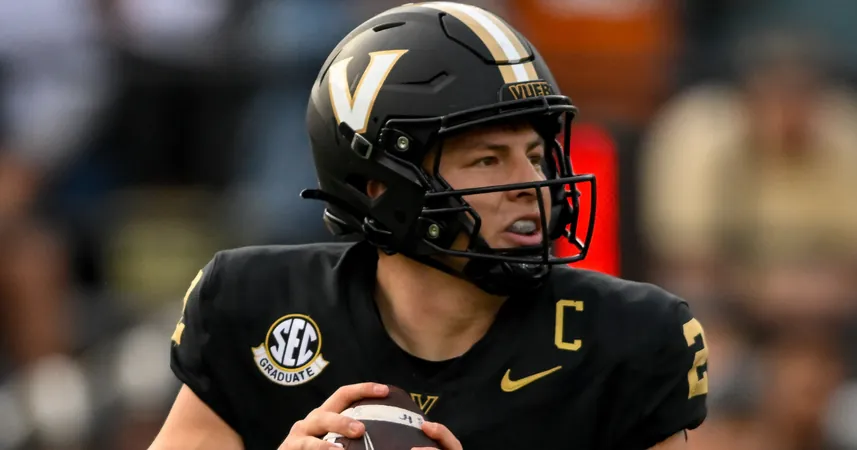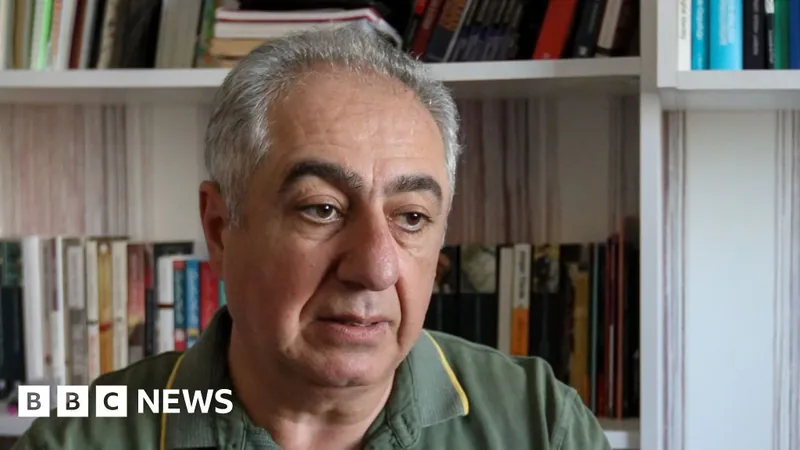
Vanderbilt Quarterback Diego Pavia Takes a Stand Against NCAA in Landmark Lawsuit Over NIL and Eligibility Rules
2024-11-09
Author: Ken Lee
In a groundbreaking move that could reshape the landscape of college athletics, Vanderbilt quarterback Diego Pavia has officially filed a lawsuit against the NCAA, highlighting the significant limitations imposed on athletes regarding their eligibility and ability to earn from their name, image, and likeness (NIL). The lawsuit, submitted on Friday in the U.S. District Court of Middle Tennessee, arises from concerns that NCAA regulations are in violation of antitrust laws and unfairly restrict athletes' opportunities.
Pavia's contention centers on how the NCAA counts junior college seasons against an athlete's eligibility. Despite transferring to Vanderbilt after two successful seasons at New Mexico State — where he was named the 2023 Conference USA Offensive Player of the Year — Pavia argues that the current rules hinder athletes who begin their careers in junior colleges from fully capitalizing on NIL opportunities. According to the lawsuit, these regulations limit junior college athletes to only two or three seasons of NCAA Division I football instead of the standard four offered to other athletes.
Pavia, who initially faced challenges gaining an FBS offer out of high school, navigated through the New Mexico Military Institute to launch his football career. His impressive performance this season has undoubtedly put him on the radar for the prestigious Heisman Trophy, with statistics boasting 1,677 passing yards, 15 touchdowns, and 563 rushing yards along with four touchdowns.
In a thrilling highlight, Pavia led Vanderbilt to a historic upset against No. 1 Alabama, marking the Commodores' first victory over an AP top-five team. This triumph not only bolstered his reputation but also showcased the competitiveness of Vanderbilt's football program. Now, as the Commodores prepare to face South Carolina, Pavia aims to continue his impressive season and build momentum toward postseason play.
The lawsuit seeks not just a temporary restraining order against the NCAA, which has currently barred Pavia from participating in the 2025-26 season due to his junior college attendance, but also a broader examination of the NCAA's restitution rules that penalize athletes and schools when ineligible players participate. Support for Pavia's case has been vocal, including backing from Vanderbilt's head coach, Clark Lea, who has expressed concern over the limitations imposed on student-athletes.
“Athletes playing football outside of the NCAA monopoly have no meaningful opportunity to profit off their name, image, or likeness,” Pavia's complaint argues, calling for reform to ensure equitable opportunities for all athletes.
This lawsuit comes amid ongoing discussions and changes surrounding NIL rights that have started to shift the dynamics in college athletics. As more student-athletes advocate for their rights, Pavia's legal challenge may lead to critical changes that enhance economic opportunities for not just himself but countless players navigating the NCAA landscape.
As attention intensifies on this case, the outcome could potentially influence the governing body’s rules and set a precedent for athlete rights in the future. Keep an eye on this developing story as it unfolds with significant implications for college football and beyond.


 Brasil (PT)
Brasil (PT)
 Canada (EN)
Canada (EN)
 Chile (ES)
Chile (ES)
 España (ES)
España (ES)
 France (FR)
France (FR)
 Hong Kong (EN)
Hong Kong (EN)
 Italia (IT)
Italia (IT)
 日本 (JA)
日本 (JA)
 Magyarország (HU)
Magyarország (HU)
 Norge (NO)
Norge (NO)
 Polska (PL)
Polska (PL)
 Schweiz (DE)
Schweiz (DE)
 Singapore (EN)
Singapore (EN)
 Sverige (SV)
Sverige (SV)
 Suomi (FI)
Suomi (FI)
 Türkiye (TR)
Türkiye (TR)